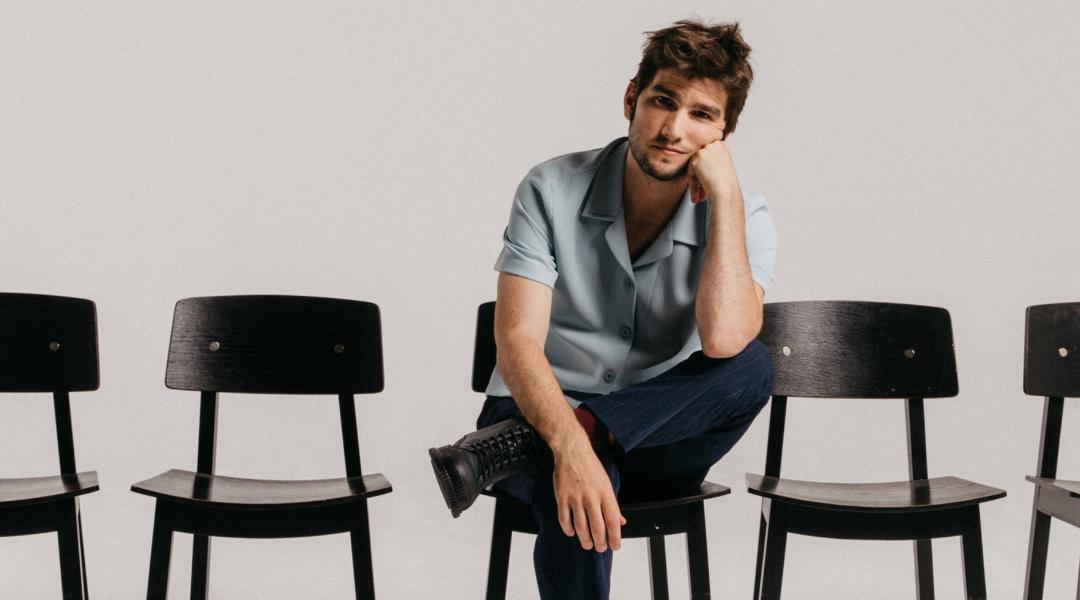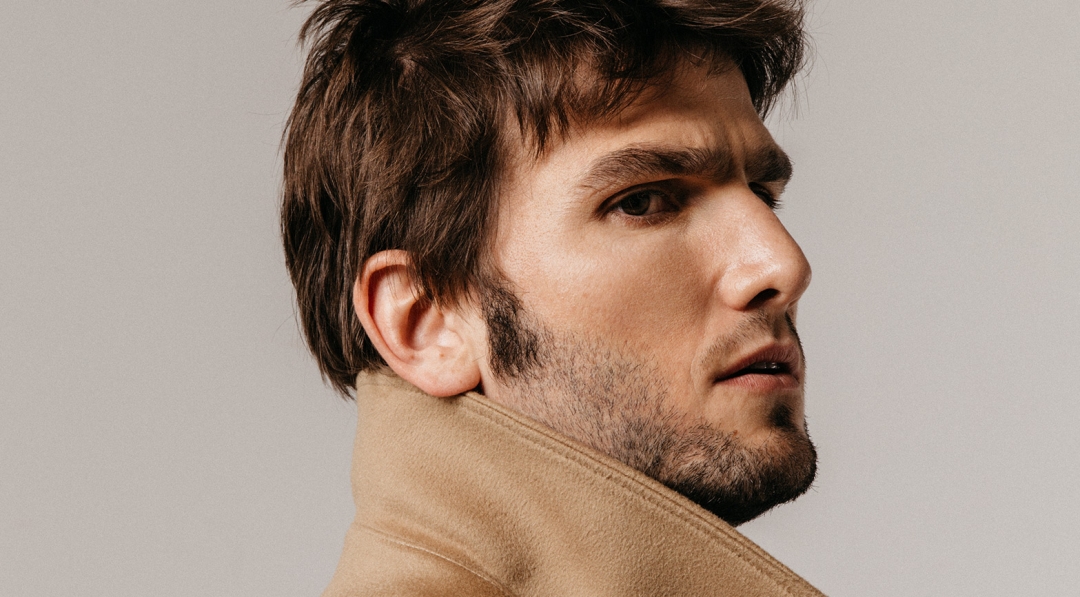Lucas Vidal
Much more than soundtracks

Lucas Vidal has signed scores for films as diverse as 'The Island Inside' or 'Fast & Furious 6', and for well-known series such as 'Welcome to Eden', 'The Minions of Midas', 'Paraíso' or 'Elite', to name some of his latest works. Born in Madrid and inspired by the likes of Bach, Wagner, Queen and Paco de Lucía, he’s also the author of the Ibero-American Anthem.
In the recording studio, composer Lucas Vidal (Madrid, 1984) rubs shoulders with big names from all musical categories, from Raphael to Amaia Montero and Pablo Alborán. He’s been awarded an Emmy for his music for the TV broadcasting of the Rio Olympics and two Goya awards —for the soundtrack of the film Nobody Wants the Night, and for the song Palmeras en la nieve, composed for the film under the same name—. He recently received an Iris Award from the Spanish Academy of Television Arts and Sciences in acknowledgement of his work for the media, he’s preparing the soundtracks for the new seasons of Elite and Paraíso, and has presented his first solo album, Karma.
There are rumours that, when you were little, you used to lower the volume on films to imagine your own soundtrack...
I was always attracted to the emotional baggage that music brings to anything audiovisual. I loved inventing melodies based on musical genres such as baroque, classical music. Somehow, I was already sure that I wanted to create and compose. When I was 16, I was lucky enough to attend a course at Berklee College of Music in Boston and discovered that this was my path. Then I continued my studies at The Juilliard School in New York while composing music for independent and short films.
It’s clear that flying has been indispensable to your life since a young age.
That’s because of studying and working abroad; that’s why some of my good friends are pilots and flight-attendants for Iberia. My life has always been closely connected to planes, my mother was an air hostess and I’ve been with her many times on business trips.
Did your family support you from the beginning of your artistic journey?
I’m lucky to have very open-minded parents who’ve supported me since day one. My cousin on my mother’s side, Zenaida Yanowsky, was principal dancer at the Royal Ballet in London and I had the chance to see her perform on many occasions. And if we add the fact that my grandfather, José Manuel Vidal, founded the record company Hispavox, which recorded artists as important as Raphael, you could say that art was my destiny.
At the age of only 28, you moved to Los Angeles and became the youngest soundtrack composer in the film industry. How do you remember that experience?
Creativity was in the air. Los Angeles is a fascinating place gathering much of the talent from around the world. It’s a hub where people know what they want and go for it, because those who move there do so to be at the heart of the film industry. I felt a lot of responsibility and learnt a lot from that time.
“Above all, I believe in daily work. What’s important is to do your job well and keep your feet on the ground”
Not long after, in 2016, you won two Goya awards. Had you ever dreamt of something like that?
It was completely unexpected. I was thrilled, of course, but it’s essential for these sorts of successes to not go to your head. Above all, I believe in daily work. What’s important is to do your job well and keep your feet on the ground.
Who are you influenced by?
Although my background is classical, there’s a mix of artists whose talent I’m inspired by. I like a little bit of everything. Bach, Wagner, Rachmaninoff and Falla are composers who’ve deeply inspired me. But, at the same time, I also enjoy electronic music, or Michael Jackson, Queen or Paco de Lucía, whose son, Francisco [Sánchez Varela, director of the documentary about his father, Paco de Lucía: A Journey, awarded a Goya in 2014] is a dear friend of mine. Who would’ve thought that we’d end up doing this when we played together as children?
As you say, your background is classical, but that doesn’t stop you from being open to other possibilities.
I think it’s good to avoid prejudices, modern music is what it is, and it moves a lot of people. Music is an evolution, and we must understand it beyond each person’s musical tastes. I greatly admire artists who can do trap or hip hop in the same way that I admire big classical names. This was one of the reasons that I wanted to work on Karma and leave the film industry on standby for two years. I wanted to develop a different sound and organically bring together two musical genres that are extremely different but have a lot in common.
“What I enjoy the most about my work is continuing to look forward, learning from other artists whom I’ve collaborated with, continuing to research constantly”
Does stopping, saying no to important assignments to work on your own record, freak you out?
It’s a hard decision to take but making a record like Karma appealed to me. I don’t want to stay in my comfort zone, I need to take risks and try to create differently. This break was extremely useful for me, I believe risk is important for any artist. I’ve been playing Karma concerts for a few months and will continue to do so throughout next year.
Do you need to face new challenges?
Being open to new ways of composing, to new styles, is crucial. What I enjoy the most about my work is continuing to look forward, learning from other artists whom I’ve collaborated with, like Antonio Orozco or Pablo Alborán, and not settling for a particular sound, rather continuing to research constantly. This was one of the reasons I made Karma, my first album, bringing together orchestral and electronic music.
One of your most recent and important works has been the Ibero-American Anthem for the PLATINO Awards, celebrating cohesion and cooperation between Ibero-American countries.
I received a call from Miguel Ángel Benzal, the general director of the PLATINO Awards, suggesting that I capture this proposal by SEGIB [the Ibero-American General Secretariat], who were the ones behind the idea of creating an anthem to strengthen these ties. I was extremely proud to collaborate in the celebration of this Ibero-American bond, because there are more things that bring us together than we think. We wanted something memorable, an orchestral anthem whose melody can then be interpreted by the different countries, adapting it to their traditions and folklore.

After training at Berklee and Juilliard, Vidal has presented his first solo album, 'Karma'. ©Universal Music
Lately you’ve done some charity work. Do we increasingly need more empathy?
Solidarity is extremely necessary, and we don’t have to look very far. You can start by practising in your own neighbourhood, in your own city. During the pandemic, I had the chance to take part in a solidarity initiative promoted by some restaurants in Madrid that handed out food to people in need. Making a small contribution helps us to keep in mind those most in need which, unfortunately, are on the rise. These things make you understand that we need to lend a hand and stop navel-gazing.
Are you an optimist? Has this crisis made us better or worse?
I hope it’s made us better. There’s been a worldwide response to the pandemic, we’ve had to come together to fight against the virus. I think this message of unity prevails, that human beings have a beautiful side that leads us to do good for others.


